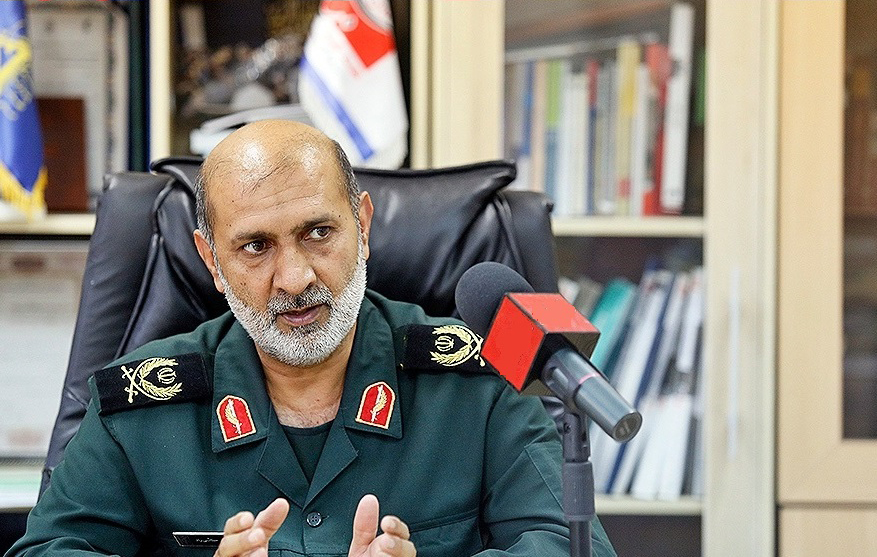Trump’s War Rhetoric Aims to Serve US Republicans: IRGC Commander

"Trump is beating the drum for war in the interest of Republicans given to the fact that he is a Republican president. Republicans have close partnership with major arms cartels and Trump is trying to serve their interests. A part of anti-Iran remarks and stances by US officials goes back to this scenario,” IRGC (the Islamic Revolution Guards Corps) Political Deputy Brigadier General Rasoul Sanayee Rad told the Basirat news and analysis website.
Following is the full text of the interview.
Basirat: Earlier this month, US warships deployed to the eastern Mediterranean launched a barrage of 59 Tomahawk missiles against Shayrat Airfield, near the western Syrian city of Homs, under the pretext of a deadly chemical incident in Khan Shaikhun which American authorities blamed on the Syrian air force without providing any evidence. What is your assessment about Trump's missile attack on Syria?
Sanayee Rad: The US missile attack on the Syrian military site had two messages. Firstly, it was a message delivered to terrorists’ regional sponsors who had accused Washington of being inactive (in the face of the Arab country’s developments) and those who expected action from the US.
Secondly, the offensive was intended to convey a message to the supporters of the Resistance Front, the Islamic Republic of Iran in particular. The US, by carrying out the attack, bided its time to send a message to key players of the ongoing conflict on the ground. It also sought to convey this message to Iran that Washington may take an adventurous approach towards Iran. In fact, the US wanted to tell Iran that the specter of war is looming over the Islamic Republic. This could be interpreted as a kind of foreign intervention in the upcoming elections which can be in the interest of those currents inside the country which have a tendency towards the West. The reason is that such currents have repeatedly claimed that they can rid the country of the risk of war through negotiations and compromise. However, the attack could have a domestic benefit for American officials to clear the ruling party of accusations that it is closely aligned with Moscow.
In fact, it had an implicit message for Russia as well as China. This sense can still be traced in the back-and-forth rhetoric between US and North Korean officials. But what is for certain is that our people have come to realize that this is the Islamic Establishment’s deterrent might which has banished the specter of war. In actual fact, the attack on Syria was part of Washington’s psychological warfare to scold the Islamic Republic. Our people have never buckled under such threats and they cannot strike fear into the hearts of [Iranian] people. Maybe it was one of Trump’s objectives. He has proved that he is unpredictable and can do insane things.
American [officials] are seeking to turn world’s public opinion against Iran and, via inspiring terror in the world, convince everyone that compromise with the West is the only way for salvation. However, Iranian nation’s political maturity has foiled such a scenario.
Basirat: US Defense Secretary James Mattis recently described Iran as a major obstacle in reaching peace in the Middle East. What is your take on his remarks?
Sanayee Rad: A similar stance had been previously taken by British officials. Before Mattis, British Prime Minister Theresa May had made anti-Iran remarks in regional meetings with heads of some Islamic countries. It seems that such comments intend to address the concerns of certain regional states and that continuation of a scenario called Iranophobia is aimed at fleecing the Arab countries. British officials have set their eyes on the Arab countries’ market to guarantee their fragile economy after the Brexit.
It looks as if that the Americans are also pursuing the same goal in the region. Trump is beating the drum for war in the interest of Republicans given to the fact that he is a Republican president. Republicans have close partnership with major arms cartels and Trump is trying to serve their interests. A part of anti-Iran remarks and stances by US officials goes back to this scenario.
Therefore, the attack on the Syrian military base was also aimed at maintaining the current atmosphere of conflict and clashes in the region to the benefit of major US arms corporations, warmongers, and warlords. By doing so (the war of attrition), they are seeking to gradually destroy the Muslim world’s power. It seems that James Mattis, who has commanded US forces in Iraq in the past and as someone who is familiar with the region, is leading the follow of those who are after Iranophobia to serve the warlords. As a result, the attack had no military value but it was only a propaganda and a war of nerves.
Basirt: Trump extended the suspension of nuclear-related sanctions on Iran for another 90 days. What is your assessment about his decision?
Sanayee Rad: We should wait and see. The Americans are creating the impression that they have concerns about the JCPOA and want to review it. This shows their confusion. They think they have this right to make use of political propaganda under various circumstances. Therefore, they continue to support a current which has a tendency towards the West inside the country as long as it serves their interests. This is while that giving unequivocal support to such parties could be damaging to Washington. Hence, it seems that there is a kind of confusion and naivety among US leaders and their stances which can be the result of an odd mixture of different political tastes in Trump’s team and others’.
















